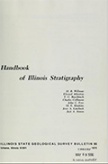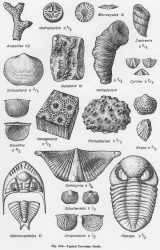Historical:Rapid Member
Lithostratigraphy: Hunton Limestone Megagroup >>Cedar Valley Limestone >>Rapid Member
Chronostratigraphy: Paleozoic Erathem >>Devonian System >>Middle Devonian Series
Allostratigraphy: Kaskaskia Sequence
Authors
Charles Collinson and Elwood Atherton
Name Origin
The Rapid Member of the Cedar Valley Limestone (Keyes, 1912, p. 149; 1913, p. 205-206), which overlies the Solon, is named for a locality in Johnson County, Iowa, not specified by Keyes.
Extent and Thickness
The Rapid is the most widespread and thickest member. It is as much as 60 feet thick in the Rock Island area, but it thins to the east and south. It forms the upper 53 feet of the quarry southeast of Milan.
Description
The Rapid Member consists of gray to buff, fine-grained, argillaceous, locally dolomitic limestone. Most of it is thick bedded, but the upper and lower parts are thin bedded and have shaly partings.
Fossils
Some beds, especially near the top and bottom, are very fossiliferous. Brachiopods and corals are most common, particularly Atrypa, Stropheodonta, Chonetes, Spirifer, Schizophoria, Pentamerella, Hexagonaria, Favosites, and Heliophyllum (Edmund and Anderson, 1967) (fig. D-6). Conodonts indicate a late Middle Devonian age (Collinson et al., 1967b).
References
COLLINSON, CHARLES, M. P. CARLSON, F. H. DORHEIM, and J. W. KOENIG, 1967b, Central Iowa Basin, in International symposium on the Devonian System: Alberta Society of Petroleum Geologists, v. 1, p. 963-971; Illinois State Geological Survey Reprint 1968-G.
EDMUND, R. W., and R. C. ANDERSON, 1967, Mississippi River Arch: 31st Annual Tri-State Field Conference Guidebook, Augustana College, Rock Island, Illinois, 64 p.
KEYES, C. R., 1912, Some provincial and local phases of the general geologic section of Iowa: Iowa Academy of Science Proceedings, v. 19, p. 147-151.
KEYES, C. R., 1913, Late Devonic sequence of the Iowa region (synopsis): Iowa Academy of Science Proceedings, v. 20, p. 205-206.
ISGS Codes
| Stratigraphic Code | Geo Unit Designation |
|---|---|

